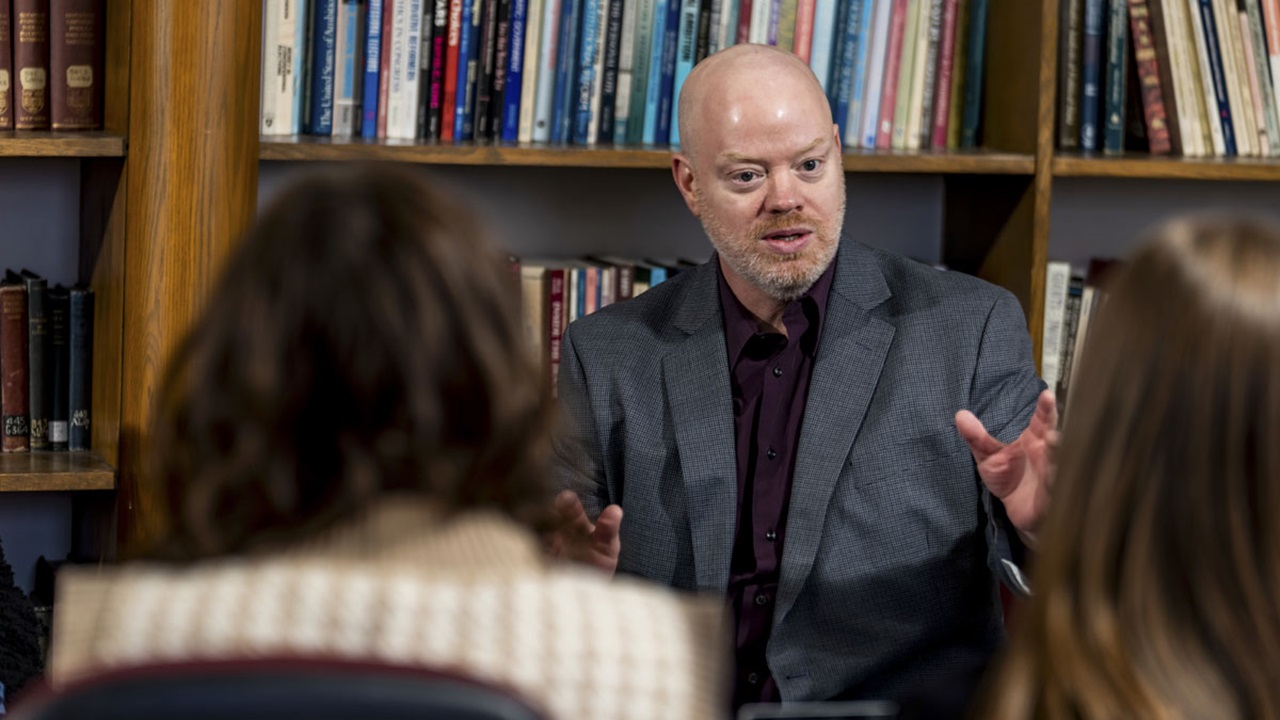The Best and Worst of Us Explored in Utopia/Dystopia Symposium at USD

Contemporary perceptions of these two intertwined concepts are the focus of the Utopia/Dystopia Symposium sponsored by the University of South Dakota and held on USD’s Vermillion campus on Monday, Feb. 6 and Tuesday, Feb. 7. The event is free and open to the public.
“The symposium draws on public knowledge of and fascination with utopia and dystopia as well as the wide-spread cultural relevance of this theme to develop participants’ consideration of the ways dystopian and utopian thinking pervade our current world,” said Lisa Ann Robertson, Ph.D., associate professor of English and one of the organizers of the symposium.
USD presenters from across the university will analyze works of literature, films, and television shows such as “Brave New World,” “Blade Runner” and “The Hunger Games” as well as discuss how the concepts of utopia and dystopia figure into the worlds of technology, science, education and social policy. The event includes a free screening of “Mad Max: Fury Road” at Vermillion’s Coyote Twin Theatre on Monday night and a keynote talk by author Alexander Weinstein and a free screening of “After Yang,” a film based on his short story of the same name.
Another symposium organizer, Skip Willman, Ph.D., associate professor of English, regularly teaches a class on utopian and dystopian literature. Students in his course start with English humanist Sir Thomas More’s 1516 book “Utopia.” More invented the term from similar Greek words ou-topos meaning “nowhere’’ or “no place” and eu-topos meaning “good place.” In More’s book, a world traveler describes a life on a distant island named Utopia, where property is communal, society is classless and social ills are non-existent.
Willman admitted student are initially put off by the dense classic text. “It’s a step-by-step blueprint for a utopian society, which, as an exercise, can be pretty boring,” Willman said. “But then students can relate to what More is proposing: that money is the root of all evil.”
Gen Z and Millennials can relate to this concept. “They have some real fears about the economy and how they fit in it,” Willman said. “If you look at many science fiction novels and dystopian texts, corporations are often the antagonists.”
Contemporary novels expand on the theme of powerful institutions subjugating the powerless and poor. Willman said Kazuo Ishiguro’s novel “Never Let Me Go,” which explores the world of young boarding school students cloned to serve as organ donors in near future Great Britain, resonates with his students.
“We’re kind of stuck in a dystopian loop,” he said. “We can’t seem to figure out where a utopia might lie.”
Cloning humans for their organs is one example of a sinister application of a scientific advancement in a dystopian future. Bess Vlaisavljevich, Ph.D., assistant professor of chemistry, said there are sometimes-unintended outcomes of developments in disciplines such as hers.
"In chemistry, our research always has a kind of utopia in mind,” she said. “We try to solve these large-scale problems. Sometimes the outcome of your research leads to consequences that you don't foresee.”
Thalidomide, for example, was a “wonder drug” used in the 1950s to counter the effects of morning sickness in pregnant women, remedied a real problem. Unfortunately, the drug compound changed in the body to also produce its mirror image, resulting in severe birth defects. “Researchers didn’t intend to make this structure, but it had this terrible consequence,” Vlaisavljevich said.
As an anthropologist, Saige Kelmelis, Ph.D., assistant professor of anthropology, studies and teaches about past pandemics and how cultures are affected in the short- and long-term.
“Major historic pandemics—including our recent one—have led to dystopian themes in history,” she said. “Epidemics and pandemics have left lasting impacts on the human imagination in literature and film that are dystopian in nature because there's a reality that diseases are one of the greatest challenges to our survival as a species.”
Kelmelis said she thinks we can learn from the recent and not-so-recent past. “I believe there is a potential utopia for us that can arise from lessons learned from past and ongoing pandemics and pandemic preparedness efforts for the future,” she said.
USD criminologist April Carrillo, Ph.D., assistant professor of criminal justice, said she also believes utopia is within reach and suggests an approach to criminal justice that focuses on prevention and redefines what is criminal behavior.
“Most crime is a result of economic or some other form of deprivation—psychological abuse, emotional neglect, no money to pay the bills,” Carrillo said. “Do we want to address these issues?”
A more benevolent society would also alter its definition of criminal activity, she added.
“A lot of criminal behavior is not exactly based on an agreed upon definition of crime, but rather a morality-like needle that moves throughout time,” Carrillo said. “Those who have alternative religious practices, dress as they like and even use drugs are consistently policed with morality laws and targeted legislation, which then leads to their eventual arrest and incarceration.”
A better approach looks at the problem differently, Carrillo said. Portugal, for instance, has seen reduced drug deaths and rates of imprisonment by treating drug use as a health issue rather than as criminal behavior.
Faculty and students from disciplines including biology, law, history and communication sciences will also provide their insights on the utopian/dystopian theme at the symposium. Contact the USD College of Arts & Sciences at [email protected] for more information. Learn more and register for the symposium at the Utopia/Dystopia Symposium website.
